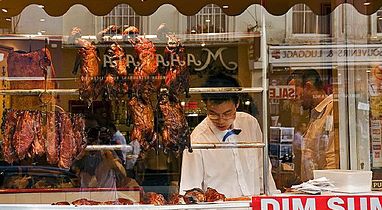找旅行社还是自助游
|
爱思英语编者按:随着诸如Agoda和Zuji一类旅游产品在线预订网站的兴起,你可能会觉得传统的旅行社需要转行了。 With the rise of online travel booking engines such as Agoda and Zuji, you might expect traditional travel agents to be looking for new careers.
But not in Asia, thanks to travelers like Nicki Fung. A former Hong Kong resident, she has relied on the same travel agent for more than a decade. 'If I can route through Hong Kong via Cathay Pacific, I'll try to do that and have her handle the rest,' says Ms. Fung, who is now based in Beijing, where she co-founded the education company Vericant. The reason for her loyalty? The travel agent 'thinks ahead for me,' she says. Not only does her agent, Christine Chiu of Shalom Travel, monitor seat availability and handle last-minute schedule changes, but she also pieces together complex itineraries. Last summer, Ms. Fung wanted to combine a work trip to Canada and the U.S. with a holiday with her mother to Kenya. 'It was much easier to work with my travel agent and have her suggest things that I wouldn't have been able to find on my own,' she says. Ms. Fung isn't alone. In Hong Kong, the number of new travel agencies cropping up has been steadily increasing over recent years. Last year, there were 1,683 members of the Travel Industry Council, a professional body whose membership is required for an operating license in the territory. In 2010, there were 1,568. 'Hong Kong citizens realize that if they want attention, they have to purchase through a licensed agent,' says Joseph Tung, the council's executive director. Convenience, saving time, personalized service伟these are all reasons why I stuck by my travel agent in Bangkok for years, especially when it came to booking flights. A good agent can be a godsend at a time when airlines are coming up with greater restrictions and fees, and ever-more complex mileage rules. My trusty agent, Mike Chan of Green Travel, had all my frequent-flier membership numbers on file, would book tickets with mileage, and snag upgrades. But not all travel agents are created equal. For every on-top-of-it agent, there are plenty who do the bare minimum. That's driven Charmaine Wai, a seasoned road warrior and director of development at INSEAD's Singapore campus, online. 'You pay a premium for a travel agent, but they don't necessarily find the best fares, and it's usually a Y-class fare, not priority,' Ms. Wai says. She adds that she prefers booking directly through an airline's website, which not only allows her to pick the fare class, but also her seat and meal. Indeed, more travelers are turning to the Internet for their holiday planning. According to a report by PhoCusWright, a U.S.-based travel market research company, the number of online bookings in Asia-Pacific is growing twice as fast as the overall travel market. By the end of this year, they're projected to make up 25% of all travel bookings. Japan, an early adopter of e-commerce, leads the region in online bookings. But markets in China and India are growing quickly amid an aggressive push by established international websites coupled with the growth of local ones such as China's Ctrip and India's Makemytrip and Cleartrip, says Douglas Quinby, senior director of research at PhoCusWright. Booking online isn't for everyone. Mr. Quinby notes that Hong Kong and South Korea伟which has the highest Internet penetration rates in the world伟are outliers that puzzle industry experts. Meanwhile, traditional agents still do good business selling to retirees and travel greenhorns on package tours. Still, the trend is undeniable. 'In markets in Northeast Asia [Hong Kong, Taiwan, Korea, and Macau], travelers are younger and more independent. We also see in India and China, city-based travelers with higher income levels booking online,' Mr. Quinby says. This bodes poorly for the family-run agency in your office plaza. That said, don't expect traditional bricks-and-mortar travel agencies to disappear entirely. In the U.S., as online travel agents, booking engines and meta-searches took off, traditional agents began tailoring their services to specific markets. Need someone to arrange a bespoke tour of ceramic workshops Japan? Try Wabi-Sabi. Looking into that once-in-a-lifetime safari in Botswana? Ring up Ker & Downey. Indeed, the line between those who use traditional agents versus those who do it themselves are more blurred than they appear. Ms. Fung regularly uses websites as research tools and books accommodations online. Mr. Quinby handles all his own business travel. But he does use an agent for an annual ski trip, which is a birthday gift to his mother. 'We get a specialist to do it,' he readily admits. Here are some key tips to finding a standout agent: Service Matters: You're more likely to find a decent agent in cities and countries with strong service cultures伟Thailand and Hong Kong, for instance. But China? If you read Chinese, better stick to meta-search engines such as Ctrip or Qunar. To the Quick: How responsive is the agent to e-mails? Can she handle everything via e-mail? Saving time and thus, staying off the phone伟is part of the appeal of an agent. After-Hour Care: Is the agent available on the weekends, and is there a mobile number you can call outside of office hours? This is especially important when you're traveling to a different time zone and need to change your flight schedule. Exploring Options: Does the agent offer you a couple of alternatives or only the most expensive one? This is where doing your own research pays off investigate the carriers that fly a route and get an idea of what the fares are before you turn to an agent. Just the Ticket: Does the agent explain clearly what the restrictions and conditions are on a ticket? If you're trying to play the mileage game, the fine print is essential.
|









